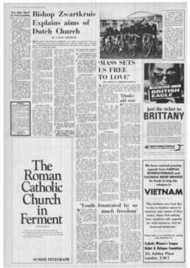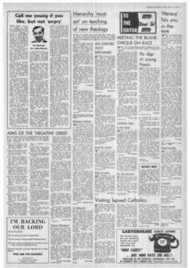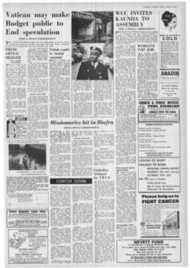Page 8, 8th March 1968
Page 8

Report an error
Noticed an error on this page?If you've noticed an error in this article please click here to report it.
Tags
Share
Related articles
A Darker Kind Of Musical
War, War, War This War Talk's Spoiling All The Fun'
John Greally Theatre
A Timeless, Classic Hitchcock Thriller
Extraordinary Hairdos
DMA John Greally THEATRE
Unbitchy Sally Bowles
CABARET at the Palace Theatre is a brilliantly staged mess. It satirises the show biz of sex at the same time as it pumps out squirt after professional squirt of titillation. While it flirts with the looming tragedy of Nazism in the Berlin of 1930, it comforts us with the thought that whatever happens we must go on having our bit of fun.
It is routine musical bubbly, but into three of the leading parts the directors have jammed outstanding straight players, Judi Dench, Lila Kedrova and Peter Sallis. Needless to say, the audience were crazy about it.
Perhaps the trouble is that there were too many hands at the job. The origin of "Cabaret" was Christopher Isherwood's notebook made on the spot in Berlin at the time. On this John Van Druten based his play I am a Camera, centred on Isherwood's character Sally Bowles, the reckless English cabaret star. A whole college of writers, musicians and designers have got together to produce "Cabaret" from the play.
One thing prevents it from quite bursting at the seams, and that is the M.C. of the Kit Kat Club, who also comperes the action of the musical itself. He is a nasty, painted hermaphrodite, crackling with salacious quips and winks and gestures, ever clutching feverishly for the audience's attention, yet betraying the hint that he is only in the game for the money.
He sings like a lively hacksaw and ogles like a stage maiden aunt. He makes fun equally of the conquering goose-steppers and of the doomed Jews. He despises humanity for its perversion, which is the only side of it he has seen. He is the personification of professional horror. Barry Dennen's playing of the part is sickening but magnificent.
It's a pity about the three topclass straight actors who have got involved in the show. With the exception of Herr Schultz, a pleasantly sympathetic character sketch by Peter Sallis, the parts are not rounded enough to be handled with anything but superficial talent. And the singing of all three stars makes painful listening. But then I don't hold with the growing idea that you can put musicals on without singers.
Apart from that, Judi Dench's Sally, though not half tarty or bitchy enough, has plenty of vitality. Lila Kedrova cannot fail to be enchanting, even when she is portraying such a dull survivalist as Fraulein Schneider. Although I think she has made a mistake in taking on the engagement, she has made her own exquisite little act of it.
There are some excitingly clever dance routines, especially the cabaret telephone song early in the show. In fact, the company footwork, directed by Ronald Field, seemed to me the most consistently effective side of the business. Top marks to coffeecoloured dancer Richild Springer. The jazz 'quartet (girls only) provides a number of delicious interludes.
The kaleidoscopic scenery, shunting in and out as if by electronics, is great fun (designer Boris Aronson). Jean Rosenthal's lighting is equally so. But one strongly objectionable trick is the method of blackout — a broadside of megaton footlights is turned on the audience, without a by your leave. The show has been brought to the West End from Broadway by directors Harold Prince and Richard Pilbrow.
blog comments powered by Disqus













